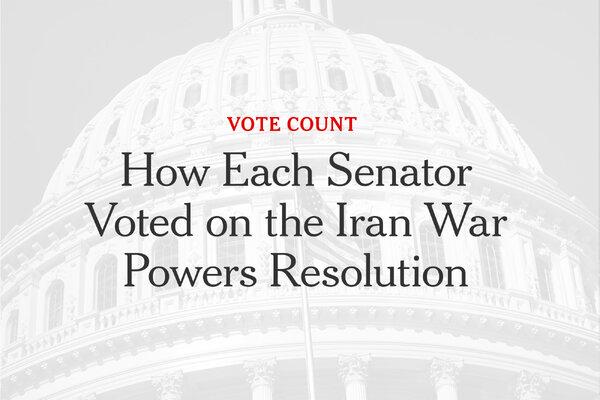The U.S. Senate has decisively blocked a resolution aimed at restricting presidential authority to engage in military action against Iran without congressional approval. In a closely watched vote, lawmakers debated the scope of executive power amid escalating tensions in the Middle East. The move underscores the ongoing struggle between Congress and the White House over control of war decisions, as concern grows over potential conflict with Tehran.
Senate Decision Reflects Deep Divisions Over Military Authority in Iran
The Senate’s recent vote has laid bare the stark rifts within the United States government regarding the extent of military authority in confronting Iran. Lawmakers remain sharply divided on whether Congress should assert its constitutional role in authorizing military operations or grant the executive branch more versatility to respond to threats. The rejection of the resolution aimed at curbing war powers signals lingering uncertainties about the scope of presidential power in matters of international conflict, especially in a region as volatile as the Middle East.
Key points fueling the debate include:
- Congressional Oversight: Advocates stress the necessity of legislative consent to prevent unchecked military engagements.
- Executive Flexibility: Opponents argue that swift responses to emerging threats require less bureaucratic delay.
- Geopolitical Complexity: The unpredictable dynamics of Iran’s regional actions complicate decisions over military intervention.
| Position | Arguments | Key Supporters |
|---|---|---|
| Limit Executive War Powers | Ensure congressional approval for military action | Majority Democrats,Some Republicans |
| Maintain Executive Flexibility | Allow rapid response to threats without delays | Majority Republicans,Presidential Management |
Implications for U S Foreign Policy and Regional Stability
Blocking the war powers resolution signals a continued commitment by the U.S. Senate to uphold Congressional authority over decisions involving military engagement with Iran. This outcome preserves the Biden administration’s operational flexibility but also raises concerns about congressional oversight, possibly setting a precedent for future foreign policy actions with minimal legislative scrutiny. The move underscores the delicate balance between executive ambition and legislative restraint in U.S. foreign policy formulation.
Regionally, the Senate’s decision may embolden Iran, influencing the geopolitical landscape across the Middle East. Key implications include:
- Strengthening Iranian influence as Tehran perceives reduced immediate threats of U.S. intervention.
- Complicating diplomatic negotiations on nuclear issues and regional security frameworks.
- Heightening instability risks in neighboring countries where proxy conflicts and tensions remain volatile.
| Factor | Potential Impact | U.S. Response Challenge |
|---|---|---|
| Iran Nuclear Program | Acceleration and reduced compliance | Pressure for renewed sanctions or diplomacy |
| Regional Proxy Conflicts | Intensified clashes in Syria, Yemen | Balancing military support with diplomatic efforts |
| Gulf Security | Heightened tensions with Saudi Arabia, UAE | Ensuring stable oil flow and alliances |
Analysis of Congressional Concerns Over Escalation Risks
Lawmakers voiced apprehension about the potential unintended consequences of granting expanded war powers related to Iran. Concerns centered on how a broader authorization might increase the risk of military escalation without clear strategic objectives or Congressional oversight. Several senators underscored the need for a careful, calibrated approach to avoid inadvertently entangling the United States in a larger conflict in the volatile Middle East region.
Key issues raised included:
- Possible escalation from vague or overly broad operational mandates
- Lack of defined limits on the use of force or an exit strategy
- Insufficient consultation procedures with Congress and regional allies
- Risks of provocations further destabilizing an already fragile geopolitical landscape
| Concerns | Potential Impact |
|---|---|
| Overbroad war powers | Unintended military escalation |
| Limited congressional oversight | Reduced accountability and transparency |
| Undefined operational limits | Prolonged military engagement |
Recommendations for Enhancing Oversight and Diplomatic Engagement
To strengthen the checks and balances surrounding military actions, Congress should implement more rigorous legislative oversight mechanisms. This includes mandatory, scheduled briefings from the executive branch and the establishment of bipartisan review committees empowered to evaluate the legality and strategic necessity of proposed military interventions. These committees should also facilitate direct input from foreign policy experts and regional specialists to ensure well-rounded decision-making. Enhanced transparency measures, such as publicly accessible reports on military engagements, can promote accountability and public trust.
On the diplomatic front, the United States must prioritize sustained, multilateral engagement with regional stakeholders to de-escalate tensions and foster dialogue. Diplomatic initiatives should be backed by comprehensive conflict prevention strategies integrating economic incentives and cultural exchanges. The following table outlines core components for a robust diplomatic engagement framework:
| Component | Focus Area | Expected Outcome |
|---|---|---|
| Multilateral Talks | Regional security cooperation | Reduction in hostilities |
| Economic Incentives | Trade agreements and aid | Encourage peaceful partnerships |
| Cultural Exchanges | People-to-people connections | Build mutual understanding |
| Conflict Prevention | Early warning systems | Rapid response to flare-ups |
Closing Remarks
As the Senate moves forward with its decision to block the Iran war powers resolution,the debate over the scope of presidential authority and congressional oversight remains sharply divided. Lawmakers on both sides continue to grapple with the implications of military engagement in the Middle East, signaling that the issue will persist as a contentious topic in the nation’s political discourse. The outcome marks a pivotal moment in the ongoing conversation about the balance of power in U.S. foreign policy and the path forward in addressing tensions with Iran.
